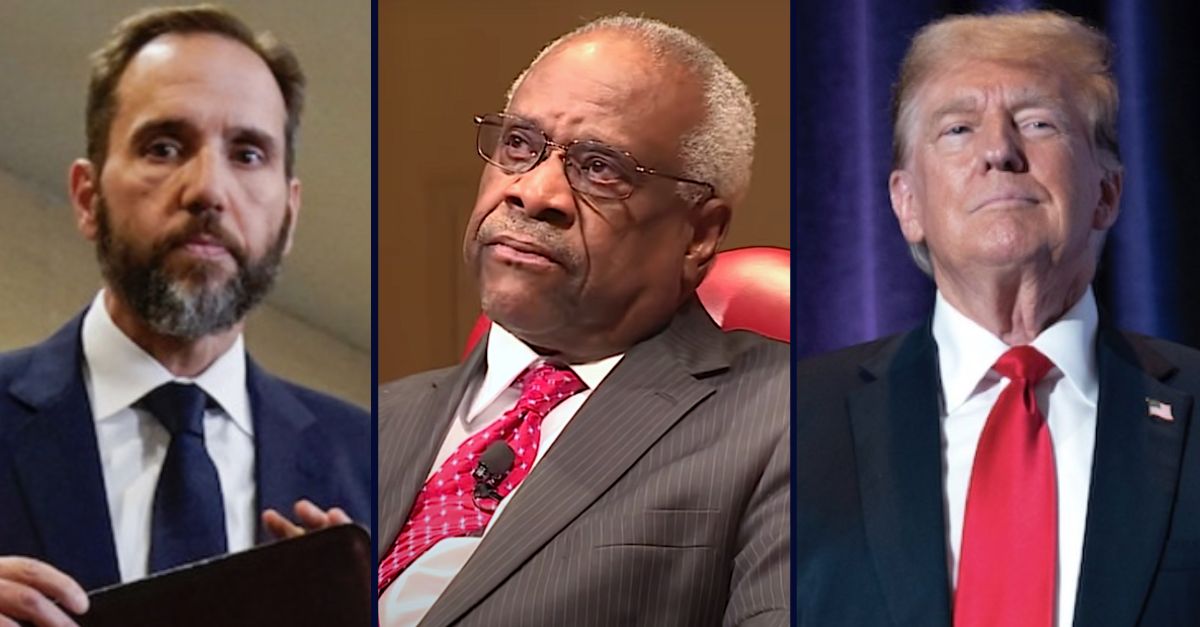
Left: Special counsel Jack Smith turns from the podium after speaking about a Trump indictment in August 2023 (AP Photo/Jacquelyn Martin). Center: Clarence Thomas (YouTube/Library of Congress). Right: Trump stands on stage at the Libertarian National Convention in May 2024 (AP Photo/Jose Luis Magana).
Attorneys for former President Donald Trump on Thursday moved to dismiss the Jan. 6 case on the basis that special counsel Jack Smith was unlawfully appointed and has unlawfully spent tens of millions of dollars “on his unjust and unwarranted prosecutions.”
The 30-page proposed motion to dismiss and for injunctive relief is premised on arguments that previously held the day in the Southern District of Florida. Namely, Trump’s attorneys argue the prosecutor in charge of the case was given his authority in violation of the U.S. Constitution’s appointments and appropriations clauses.
While those arguments did prove successful in one courtroom, in the Mar-a-Lago documents case, U.S. District Judge Tanya Chutkan has, so far, appeared disdainful of the idea that U.S. District Judge Aileen Cannon’s summer decision might be cited as controlling precedent.
That’s no problem for the 45th president — his latest motion largely relies on U.S. Supreme Court Justice Clarence Thomas.
“In an intervening opinion issued while this case was stayed, Justice Thomas observed that ‘there are serious questions whether the Attorney General has violated [our Constitutional] structure by creating an office of the Special Counsel that has not been established by law,’ and he instructed that ‘[t]hose questions must be answered before this prosecution can proceed,”” the filing reads. “In another intervening decision, a District Court issued a thorough and well-reasoned opinion that relied in part on Justice Thomas’s concurrence, credited many of the arguments raised in President Trump’s proposed motion, and dismissed charges unlawfully filed.”
The analysis offered by Thomas, of course, came as a concurrence — not the majority opinion — in the landmark case where Chief Justice John Roberts issued a broad grant of presidential immunity to Trump. Cannon would go on to famously use the concurrence to that opinion to squelch special Smith’s authority and dismiss the case.
Thomas was the only justice to cite the long-simmering Appointments Clause issue in an unfavorable light for the government in any of the opinions attached to Trump v. United States. The majority opinion actually lists, offhandedly, several ways in which the appointments power inures to the executive’s benefit. Thomas was also the only justice to mention the phrase “Appointments Clause” directly.
Thomas’ concurrence largely echoed arguments made by conservative amici curiae (Latin for “friends of the court”) on the Mar-a-Lago case docket. Somewhat controversially, Cannon recently heard oral arguments from several groups of amici regarding the legality of Smith’s appointment as special counsel.
Those amici asserted “private citizen” Smith’s appointment by U.S. Attorney General Merrick Garland violated the Constitution because he was neither confirmed by the Senate nor sufficiently “authorized” by statute. Trump and his co-defendants, for their part, made similar objections to Smith’s role and funding in various defense motions.
And, though Trump v. United States was not about the Mar-a-Lago case, Smith and his office were implicated because he is the special counsel who brought and led both prosecutions.
In the present motion, the former president’s attorneys figured that one successful shot might as well be tried again by echoing the arguments highlighted by Thomas. The Thursday effort to dismiss the indictment mentions Thomas by name no less than 19 times.
From the filing, at length:
Justice Thomas instructed that the “essential questions” raised in the proposed motion “must be answered before this prosecution can proceed.” … Equally important is the fact that Justice Thomas’s concurrence and Judge Cannon’s thorough intervening decision present important and thoughtful reasons — many of which have not been addressed in this Circuit — supporting President Trump’s position that Smith’s appointment and work have violated the Appointments and Appropriations Clauses.
Calling the appointment clause issue a “fatal Constitutional defect” that is “causing irreparable harm,” Trump’s motion argues the superseding indictment filed by Smith — which was rewritten and refiled to comply with the high court’s presidential immunity decision — “must be dismissed.”
The filing ominously casts Smith’s grant of authority as a political effort by President Joe Biden to hamstring his greatest rival.
Again, the motion, at length:
The proposed motion establishes that this unjust case was dead on arrival — unconstitutional even before its inception. In November 2022, the Attorney General violated the Appointments Clause by naming private-citizen Smith to target President Trump, while President Trump was campaigning to take back the Oval Office from the Attorney General’s boss, without a statutory basis for doing so. Garland did so following improper public urging from President Biden to target President Trump, as reported at the time in 2022, and repeated recently by President Biden through his inappropriate instruction to “lock him up” while Smith presses forward with the case unlawfully as the Presidential election rapidly approaches. Everything that Smith did since Attorney General Garland’s appointment, as President Trump continued his leading campaign against President Biden and then Vice President Harris, was unlawful and unconstitutional.
As for the appropriations clause issue, Trump’s legal team offers something not entirely unlike a sticker shock argument.
“Between November 2022 and March 2024, Smith spent almost $20 million on his unjust and unwarranted prosecutions targeting President Trump,” the motion reads. “He has almost certainly spent many more untold millions more between March 2024 and today. In addition to the $20 million spent directly by Smith and his Special Counsel’s Office prior to March 2024, other unspecified ‘components’ of the Biden-Harris administration have spent more than $16 million on the same unlawful project. All of that money was spent in violation of the Appropriations Clause.”
To that end, the defense argues, “the Court should enjoin Smith and the Special Counsel’s Office from spending additional public funds in furtherance of the invalid Appointment Order.”
Technically, Trump’s filing is stylized as a motion requesting leave — an effort to get permission from Chutkan to make a more formal argument for dismissal and to enjoin Smith from spending any more money on the Jan. 6 case. Still, the filing advances the request for both forms of relief in a combined bid for leave by arguing that Trump has shown statutory “good cause” to raise the issues around Smith’s authority and funding.
“Smith’s lack of standing cannot be ignored,” the motion goes on. “The Court does not have jurisdiction over a criminal prosecution maintained by someone other than an attorney for the United States, and so must address this issue.”
Have a tip we should know? [email protected]







